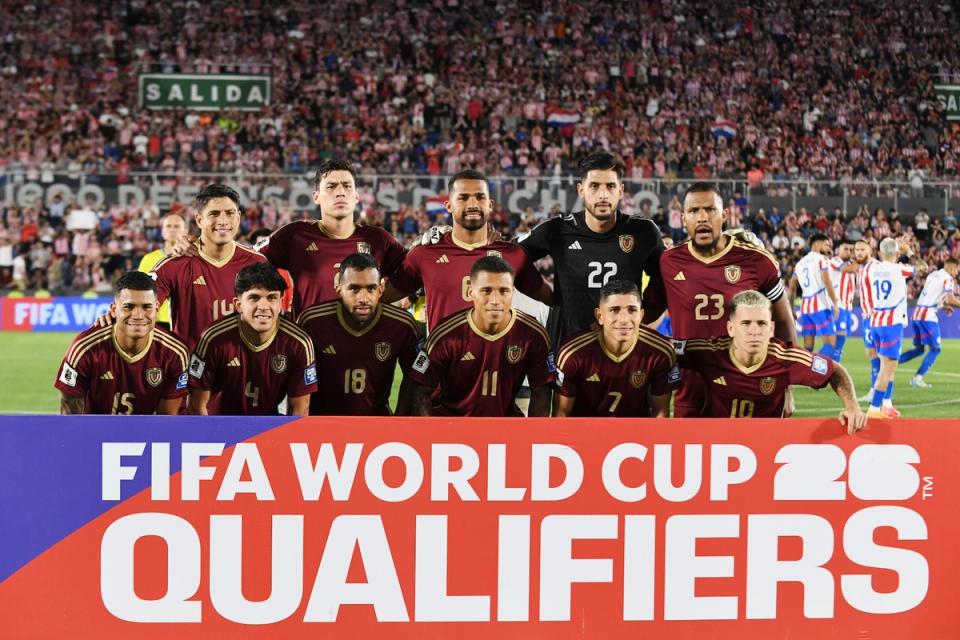The U.S. Men’s National Team will kick off a pivotal 2025 with the traditional January camp and friendlies, where coach Mauricio Pochettino will have an opportunity to assess a cohort of domestic prospects hoping to solidify or advance their position on the depth chart.
The build toward the 2026 World Cup will be anchored this year by the Concacaf Nations League final four in March and then, critically, the 2025 Concacaf Gold Cup in June and July. But it will begin in Florida, where Pochettino and a squad of 24 men with a range of international experience are preparing for matches against Venezuela and Costa Rica.
This year’s January camp will be punctuated by Saturday’s match against Venezuela at Chase Stadium in Fort Lauderdale (3 p.m. ET on TNT, Telemundo, Universo, Max, Peacock and Fútbol de Primera radio) and then a Jan. 22 meeting with regional rival Costa Rica at Inter&Co Stadium in Orlando (7 p.m. ET on TNT, TruTV, Universo, Max, Peacock and Fútbol de Primera radio).
Tickets for the Venezuela match are available here and tickets for the Costa Rica match are available here.
While Costa Rica is a familiar adversary, Venezuela hasn’t faced the USMNT since 2019. Here are five things to know about this month’s first opponent.
SOCCER IN VENEZUELA
CONMEBOL’s logo features a fingertip motif, suggesting without much subtlety that soccer is an intrinsic part of South America’s identity. The DNA in Venezuela, however, skews a bit different.
Thanks to U.S. and Caribbean influence in the early 20th century, it was baseball that grabbed an early hold on Venezuelan culture and consciousness. By the 1940s, baseball had been professionalized and was the clear No. 1 sport (the country has furnished hundreds of players to Major League Baseball). Soccer has been playing catch-up since. Venezuela didn’t join FIFA until 1952 and didn’t enter World Cup qualifying or the Copa América until the 1960s.
Although those initial decades were bleak, La Vinotinto (named for the distinctive burgundy color of their primary jerseys) turned a corner and became more competitive around the turn of the millennium. Venezuela remains the only one of CONMEBOL’s 10 members that hasn’t played in a World Cup, but it has won multiple qualifiers in recent cycles and came close to reaching FIFA’s intercontinental playoff in 2010. It has also had better luck at the Copa América, advancing to the knockout stage in five of the past seven tournaments and finishing fourth in 2011.
Venezuela’s men spent most of the 1990s below 100th in the FIFA ranking. But they’ve routinely cracked the top 50, and were as high as 25, over the past dozen years (they’re currently 47th.) In addition, the U-20 side reached the U-20 World Cup Final in 2017 and lost to England.
The all-time scoring and cap leaders remain active. Salomón Rondón, 35, is the runaway leader in national team goals with 45. He helped lift Pachuca to the 2024 Concacaf Champions Cup with two goals in the final against the Columbus Crew. Santos midfielder Tomás Rincón, 37, is the most capped Venezuelan with 139.
La Vinotinto’s improvement has benefitted pro soccer in the U.S, as more than 40 Venezuelans have played in MLS. Among the most significant success stories are Giovanni Savarese, who starred for the New York Red Bulls during their MetroStars era before winning trophies as a coach for the New York Cosmos and Portland Timbers; Alejandro Moreno, who lifted MLS Cups with the LA Galaxy, Houston Dynamo and Columbus Crew and now is an ESPN pundit; and new San Jose Earthquakes signing Josef Martínez, an MLS Cup and US Open Cup winner with Atlanta United who was league MVP in 2018.
USMNT HISTORY VS. VENEZUELA
The USA and Venezuela have a modest history, meeting six times overall and just once in official competition. The Americans hold a 3W-1L-2D advantage in the series.
La Vinotinto’s sole victory came in the most recent meeting, a June 2019 friendly in Cincinnati that was part of the USA’s Concacaf Gold Cup preparation. The sides drew, 1-1, in a June 2017 exhibition in Sandy, Utah, which followed U.S. shutout wins in 2003, 2006 and 2012 (all on home soil).
The most important game in the series was the first one, a Copa América clash in the group stage finale of the 1993 tournament in Ecuador. After losing to Uruguay and the hosts, the Americans remained alive for a quarterfinal berth in their Copa debut thanks to the competition’s forgiving 12-team format. Their prospects improved when goals by Chris Henderson, Alexi Lalas and Dominic Kinnear lifted the U.S. to a 3-0 lead in Quito. But Venezuela recovered and scored in the 68th, 80th and 89th minutes to earn a 3-3 draw and send the USA home.
Venezuela has a relatively successful history on U.S. soil. While it’s won just 11 Copa América matches in its history, five came during the 2016 and 2024 tournaments hosted by the U.S.
Mauricio Pochettino was credited with his only national team assist in his only appearance against Venezuela, a 5-0 World Cup qualifying romp in March 2001. Pochettino knocked a short, 85th-minute pass toward Walter Samuel, who headed home Argentina’s fifth and final goal at the Estadio Monumental in Buenos Aires.
VENEZUELA’S RECENT FORM
Venezuela would be near the top of any list of countries hoping to benefit from the World Cup’s expansion to 48 teams. Earning one of CONMEBOL’s four automatic berths was a steep challenge during the 32-team era, which ended in 2022. But with six CONMEBOL slots available for 2026, plus a playoff spot, La Vinotinto’s dream of breaking through became far more realistic.
Venezuela’s 2026 qualifying journey started well. It concluded 2023 with a 2W-1L-3D record in CONMEBOL’s marathon round-robin, good for fourth place. Then, an unprecedented 3W-0L-0D run through the group stage of the 2024 Copa América appeared to confirm La Vinotinto’s arrival. But their fortunes have dipped since. In the Copa quarterfinals, Canada eliminated Venezuela on penalties in Arlington, Texas, and La Vinotinto then went winless in six World Cup qualifiers to close out 2024. The 0W-3L-3D slide dropped them to eighth in the CONMEBOL table (2W-4L-6D), one point out of the playoff spot and four points behind sixth-place Paraguay.
Venezuela has slipped 10 places in FIFA’s ranking since the Copa América, falling from 37th in July to 47th.
The Venezuela team that takes the field against the USA in Fort Lauderdale will be younger and less experienced than the one contesting World Cup qualifiers, which is typical for winter friendlies falling outside a FIFA window. Saturday’s friendly will be about searching for prospects who might supplement the first-choice squad when qualifying resumes in March, rather than reversing momentum.
THE HEAD COACH
Like the USA, La Vinotinto employ an Argentine at the helm. Fernando Batista, 54, was an Argentine youth national team coach when he joined former Venezuela manager José Pékerman’s staff in late 2021.
A retired defender, Batista previously coached Argentina’s U-20 and U-23 national sides, succeeding Lionel Scaloni with the former. Batista was in charge at both the 2019 FIFA U-20 World Cup in Poland and the delayed Tokyo Olympics in 2021. Although Argentina’s results at both events were disappointing, Batista was in position to help develop future World Cup winners Julián Álvarez, Alexis Mac Allister and Thiago Almada while working with several others.
Pékerman was dismissed by Venezuela in March 2023 and his countryman, Batista, was promoted. La Vinotinto kicked off its 2023 slate with a 2-1 friendly victory over Saudi Arabia in Jeddah and now are 8W-5L-9D under Batista(5W-4L-7D in official competition.) The highlight was a perfect group stage at the 2024 Copa América, where Venezuela then fell to Canada on penalties in the quarterfinals.
Before succeeding Pékerman, Batista had never coached senior players. He worked with the youth at San Lorenzo and Argentinos Juniors from 2004 to 2016, spent a year in Armenia then returned to Argentina to take over the U-20s. Batista won an Argentine Primera División title as a San Lorenzo player in 1995 and a gold medal at the 2019 Pan American Games as Argentina’s U-23 coach.
VENEZUELA’S SQUAD
Batista has called in a squad similar to the USA’s, one grounded primarily in youth and domestic talent. Among the 24 call-ups, 11 are uncapped and 17 have three caps or fewer. Eleven come from Venezuelan clubs and another three are free agents. Those 24 players have scored a combined five international goals.
The most experienced player is right back Roberto Rosales (95 caps), who recently returned to the domestic league after a lengthy career in Belgium, Netherlands, Spain, Cyprus and Brazil. The 36-year-old hasn’t played for La Vinotinto since the summer of 2023. Goalkeeper Wuilker Fariñez was a national team regular in 2017-22, and was in net when Venezuela blanked the USA, 3-0, in June 2019 in Cincinnati (Rosales also played that day). Free agent center back Rubén Ramírez started a trio of World Cup qualifiers last fall.
Defender Carlos Vivas, a 22-year-old with one cap, was named Liga FUTVE’s 2024 MVP for his performance with champion Deportivo Táchira.
Fans in the USA may recognize Atlanta United right back Ronald Hernández, who hasn’t played for Venezuela since March 2023, as well as Orlando City goalkeeper Javier Otero and Austin FC midfielder Daniel Pereira. Pereira earned his fifth and most recent cap in the Sept. 5, 2024 World Cup qualifying loss at Bolivia.
DETAILED VENEZUELA ROSTER BY POSITION
GOALKEEPERS (2): Wuilker Feriñez (Caracas FC; 40/0), Javier Otero (Orlando City/USA; 1/0)
DEFENDERS (8): Anthony Graterol (Sol de América/PAR; 0/0), Thomás Gutiérrez (Sportivo Ameliano/PAR; 0/0), Ronald Hernández (Atlanta United/USA; 33/1), Francisco La Mantía (Caracas FC; 3/0), Rubén Ramírez (unattached; 3/1), Carlos Rojas (Deportivo La Guaira; 0/0), Roberto Rosales (Deportivo Táchira; 95/1), Carlos Vivas (Deportivo Táchira; 1/0)
MIDFIELDERS (10): Juan Pablo Añor (Caracas FC; 27/1), Maurice Cova (Deportivo Táchira; 0/0), Erickson Gallardo (Monagas; 3/0), Matías Lacava (unattached; 1/0), Gleiker Mendoza (Angostura; 0/0), Júnior Moreno (unattached; 41/1), Bryant Ortega (Al Ittihad/KSA; 0/0), Daniel Pereira (Austin FC/USA; 5/0), Edson Tortolero (Carabobo; 0/0), Jorge Yriarte (Real Murcia/ESP; 0/0)
FORWARDS (4): Jovanny Bolívar (Kolos Kovalivka/UKR; 0/0), Bryan Castillo (Deportivo Táchira; 0/0), Saúl Guarirapa (CSKA Moscow/RUS; 0/0), Jan Hurtado (Atlético Goianiense/BRA; 10/0)







